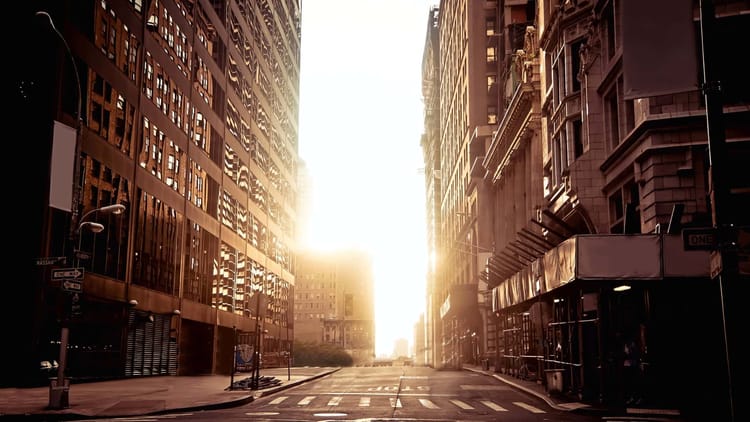Living with Adversity (Ecclesiastes 6:10-7:14)

A couple of years ago I took my son to see the Pixar animated movie Up about the last adventure of a 78-year-old balloon salesman named Carl Fredricksen. I thought I was going to see a fun story. I wasn’t prepared for one poignant, four-minute scene.
The scene is wordless. The vignette starts with a brief glimpse of Carl and Ellie’s wedding day, and then moves to their first home and first jobs. The couple race up a grassy hill together, then look up at the sky and imagine pictures forming in the clouds. Then the clouds are all shaped like babies, and then Carl and Ellie are painting a nursery together. It’s an idyllic look at young love and marriage.
But this isn’t an idyllic life. The scene shifts to Carl and Ellie in a hospital room with pre-natal diagrams on the walls. A doctor is talking and gesturing. Ellie is weeping into her hands. Next, Carl comforts his wife by reminding her of an old dream they shared when they were children—traveling to a place called Paradise Falls together. Rejuvenated, Ellie creates a dream jar labeled “Paradise Falls,” and into the jar goes all of the young couple’s spare money.
Again, however, life happens. First their car pops a tire. Then Carl visits the hospital. Then a tree falls and damages the roof of their home. Each of these inconveniences necessitates the dream jar be smashed and the money spent. Soon, Carl and Ellie have gray in their hair. And in a flash they become elderly.
Near the end of the vignette, Carl remembers their dream of visiting Paradise Falls, and he purchases two tickets from a travel agency. But Ellie collapses on her way back up the grassy hill from their youth. We see her in a hospital bed, with Carl holding her hand and kissing her forehead. Then we see Carl sitting alone at the front of a church. He holds a solitary balloon in his hand. The vignette closes as Carl carries the balloon into his house, which has turned cold and gray. The balloon is a lone spot of color against the gloom, and then everything fades to black. In four minutes you see a lifetime come and go.
It’s a wonderful triumph of filmmaking. But more importantly, the series of clips and scenes is a portrayal of the human story. Our lives are fun, deep, tragic, and tender. But they are also brief—”a mist that appears for a little while and then vanishes” (James 4:14). The scene ends, and you’re left thinking about the brevity of your life. It’s brief, filled with both tenderness and tragedy. How do we live in a world that’s short and filled with so much beauty, but also so much that’s tragic and out of our control?
That’s exactly what the book of Ecclesiastes is about. We’re at the midpoint of the book. Let me give you the abridged version of what the Teacher has examined so far. He’s examined life to try to find meaning. He’s looked at all the ways that we try to find meaning and fulfillment in life – pleasure, work, riches, and even social justice – and he’s found that none of them provide the meaning we’re looking for. He calls it all vanity. Everything, the writer says, is fleeting, elusive, and very temporary.
That’s been the message of the book so far. We’re now in the second half of the book. The second half of Ecclesiastes is about the conclusions that the Teacher is drawing. Given that we can’t find meaning in pleasure, work, or riches, how then should we live?
How do we live when we’re not in control, and when we don’t know what’s good for us?
The problem is put in stark terms in 6:10-12:
Whatever has come to be has already been named, and it is known what man is, and that he is not able to dispute with one stronger than he. The more words, the more vanity, and what is the advantage to man? For who knows what is good for man while he lives the few days of his vain life, which he passes like a shadow? For who can tell man what will be after him under the sun? (Ecclesiastes 6:10-12)
Here’s what the Teacher is saying. The future, he says, is largely determined by God. God is sovereign; his will prevails. Whatever happens has already been determined by God in the past. We are so weak that we are not able to contend with God about his will. God is the powerful Creator; he is in control; we are mere creatures who cannot dispute with the sovereign Lord of the universe. We don’t know what’s coming. We don’t even know what’s good for us. The things that we think are good for us are often bad; the things we think are bad often end up being good for us. What’s more, we don’t know what tomorrow will bring. Will tomorrow be a good day? Or will tomorrow be a day of adversity? We don’t know. Will we be happy? Or will we be mourning? We don’t know. The future is hidden, and we’re not in control. How then do we live?
You know those antique car rides for kids? The cars run on a track, so they go wherever the track goes. The kids get in, and for the first time in their lives they have a steering wheel in front of them. They’ve never driven before. Dad’s beside them, and inevitably as the car comes up to the curve the Dad yells out in mock panic, “Turn! The curve’s ahead!” The kid turns, and in the back the Mom is rolling her eyes. You see, the kids aren’t in control of the car, even though they think they are. The track is. That car is going to go where the track wants it to go no matter how much the kid steers.
The Teacher is saying that we like to think we’re steering our lives. But we’re not. God is in control, and he is taking us exactly where he wants us to go. The problem is that we don’t know where he’s taking us, and we don’t even know if it’s good or bad. So how do we live in a world in which we’re not in control, and we don’t even know what’s good for us?
Well, the Teacher is no pessimist. Chapter 7 gives us the Teacher’s response to the question of how we should live in a world that’s out of our control, a world in which we don’t even know what’s good for us. At first it looks like he’s making a number of random comments in verses 1 to 13. They look like proverbs, like pithy statements that communicate basic truths. But there’s a theme to what he’s saying.
He’s been saying that God is in control of our lives, and not us. We can’t argue with God’s purposes, and we don’t even know what’s good for us. So how do we live when we’re not in control, and adversity may be coming our way? In chapter 7, the Teacher gives us the answer. He gives us three examples of things that could come our way that might be bad, and then argues that they’re actually good. The main point he’s making in this passage is this: God is in control, so look for what’s best even in what looks bad. There are three things that we normally think are bad, and that could come our way, but the Teacher says they can actually be good. These three things are death, rebuke, and persistence. Nobody would choose to experience these three things, but the Teacher says that they are actually better than if we avoid them.
First, death.
Read verses 1-4 of chapter 7:
A good name is better than precious ointment,
and the day of death than the day of birth.
It is better to go to the house of mourning
than to go to the house of feasting,
for this is the end of all mankind,
and the living will lay it to heart.
Sorrow is better than laughter,
for by sadness of face the heart is made glad.
The heart of the wise is in the house of mourning,
but the heart of fools is in the house of mirth.
Here, the Teacher says, thinking about our death is better than living in denial. This is surprising at first. We can understand the first part of verse 1: “A good name is better than precious ointment.” Nobody would debate that. You know the value of a good name. You can buy ointment; you can’t buy a good name. But then he says that in the same way, the day of death is better than the day of birth. How does that make sense? One would think that there’s more joy at a birth than there is at a death. He goes on to say in verse 2 that it’s better to go to a house of mourning than to a house of feasting. Is it really better to go to a funeral home than to a wedding reception? Few would say so. Then the Teacher gives us the reason why this is so: “for this is the end of all mankind, and the living will lay it to heart.”
Here’s the reason: because we can’t afford to live in denial of death. Everything in us wants to believe that we’ll never die. It’s so easy to buy into this, and there are a lot of products at Shoppers Drug Mart that will help you perpetuate this belief. We can’t afford to live in denial about the fact that our life is short, and that we will die.
A family from our church visited a crypt (Capuchin Crypt) in Rome this past summer. The crypt displays the skeletal remains of over four thousand bodies of its friars buried in its order. At first, they were scandalized by this. As they were leaving the crypt, they came across a sign that explained the display: “What you are now we used to be; what we are now you will be.” All of a sudden it made sense. The display is a silent reminder that this is our future too.
Charles Spurgeon said this about death:
It is much nearer to us than we think. To those of you who have passed fifty, sixty, or 70 years of age, it must, of necessity, be very near. To others of us who are in the prime of life, it is not far off, for I suppose we are all conscious that time flies more swiftly with us, now, than it ever did. The years of our youth seem to have been twice as long as the years are, now, that we are men. It was but yesterday that the buds began to swell and burst—and now the leaves are beginning to fall and soon we shall be expecting to see old winter taking up his accustomed place. The years whirl along so fast that we cannot see the months which, as it were, make the spokes of the wheel! The whole thing travels so swiftly that the axle thereof grows hot with speed. We are flying, as on some mighty eagle’s wing, swiftly on towards eternity. Let us, then, talk about preparing to die. It is the greatest thing we have to do—and we have to do it soon—so let us talk and think something about it.
You’re not in control of your life, and you wouldn’t choose to encounter death. But it’s a good thing, because it keeps us from living in denial about our own future death, says the Teacher.
But there’s more. There’s a second thing that we’d rather avoid, but that can be very good for us.
Second, rebuke.
In verses 3 and 4, the Teacher has already told us that sorrow is a better teacher for us than laughter. Verses 5 and 6 continue this theme:
It is better for a man to hear the rebuke of the wise
than to hear the song of fools.
For as the crackling of thorns under a pot,
so is the laughter of the fools;
this also is vanity.
The Teacher is drawing a contrast. On one hand you have boisterous laughter, the songs and the laughter of fools. You can picture the silly laughter of a group of friends who have had a bit too much to drink, or the locker room antics of a bunch of guys acting goofy. He compares this to the sound of crackling thorns under the pot – in Hebrew it’s a rhyme, sort of like saying that it sounds like “nettles crackling under kettles” (Phil Ryken). If you burn thorns, it will make a lot of noise, but it won’t last long, and it won’t give much heat. You can laugh and sing at a party, but it’s not likely that you’ll learn anything.
On the other hand, the Teacher says, is the rebuke of the wise. If you had to choose between door number one (laughter and singing) and door number two (the rebuke of the wise), which would you choose? The Teacher says that it’s far better to hear the rebuke of the wise. We need this. The rebuke of the wise can save our souls.
Tony Evans tells about the time that he was driving down a one-way street. All of a sudden he saw a car coming towards him. He was alarmed; that guy was totally wrong. He heard voices all around him trying to get his attention. It turns out that it wasn’t the other car that was going the wrong way; he was. They were trying to get his attention, to prevent him from going further down that road. He writes:
I suspected that there were two reasons for their concern. One is the damage that I could do to myself. The other is the damage I could do to others. They could have simply ignored it, and said, “That’s his business.” Or, they could do what they did, which is try to get my attention, because they understood that when you’re going the wrong way, somebody needs to confront you, so that you can reverse your direction.
Nobody goes looking for rebuke, but it’s needed. It’s better than the laughter of fools.
Finally, the Teacher says, there are occasions that call for patience.
Read verses 7 to 10:
Surely oppression drives the wise into madness,
and a bribe corrupts the heart.
Better is the end of a thing than its beginning,
and the patient in spirit is better than the proud in spirit.
Be not quick in your spirit to become angry,
for anger lodges in the bosom of fools.
Say not, “Why were the former days better than these?”
For it is not from wisdom that you ask this.
Here, the Teacher first cautions us against the abuse of power in verse 7. But then he tells us to take the long view as we look ahead. The end of a thing is better than the beginning, he says, and the patient in spirit are better than the proud in spirit. Don’t become nostalgic and long for the good old days, and don’t get impatient. When you’re in the middle of the muck, this is hard stuff! If you have a job you hate, you might long for the past, or want to escape from the present, but in the meantime you might miss what God wants to teach you if you just stick with it. If you’re trying to save a marriage, you might have to commit for the long haul before you see any payback. It’s easy to long for the old days or to want to give up, but hang in there. The end is better than the beginning, but you’ll never see it if you’re not patient.
Our temptation in adversity is always to look for the easy way out. It’s always tempting to look back in nostalgia or to look for a way out. How often do we miss the payback that comes from patiently enduring and looking to the end with true grit?
God is in control, so look for what’s best even in what looks bad. Look for what’s good even in the face of death, when being rebuked, and even in the middle of a situation you’d rather escape. These things aren’t what we’d choose, but there’s a lot of good in them if we’re willing to learn.
What’s really needed, the Teacher says, is wisdom. In verses 11 and 12, the Teacher sings the praises of wisdom. If you have wisdom you’ll be able to see the good even in what’s bad. Wisdom is as valuable as an inheritance or a small fortune. It’s even better, actually. It will give you life. When you’re wise you’ll be able to see the good even in what’s bad.
So here’s the conclusion in verses 13 and 14:
Consider the work of God:
who can make straight what he has made crooked?
In the day of prosperity be joyful, and in the day of adversity consider: God has made the one as well as the other, so that man may not find out anything that will be after him.
Here’s what he’s saying: God is in control of your life. You don’t know what’s coming your way, and even if you did, you wouldn’t know what’s good and what’s bad. So enjoy the days of prosperity that God gives you! But even in the days of adversity, consider God. You don’t know what he’s up to. He has a purpose that you may not know about, so look for what’s good even in adversity. God is in control, so look for what’s best even in what looks bad.
Paul wrote:
What then shall we say to these things? If God is for us, who can be against us? He who did not spare his own Son but gave him up for us all, how will he not also with him graciously give us all things? (Romans 8:31-32)
If God loved us enough to give us his Son, who took our sins and died for us willingly and out of great love, then we can trust that God has a purpose even when we don’t understand it, even when we are going through times of adversity.
In his book If God Is Good: Faith in the Midst of Suffering and Evil, author Randy Alcorn recalls when his friend, writer Ethel Herr, had a double mastectomy. Two months later doctors discovered that the cancer had spread. One of Herr’s friends, shocked and fumbling for words, asked her, “And how do you feel about God now?” Reflecting on the moment the question was posed to her, Herr says:
As I sought to explain what has happened in my spirit, it all became clearer to me. God has been preparing me for this moment. He has undergirded me in ways I’ve never known before. He has made himself increasingly real and precious to me. He has given to me joy such as I’ve never known before—and I’ve no need to work at it, it just comes, even amidst the tears. He has taught me that no matter how good my genes are or how well I take care of my diet and myself, he will lead me on whatever journey he chooses and will never leave me for a moment of that journey. And he planned it all in such a way that step by step, he prepared me for the moment when the doctor dropped the last shoe … God is good, no matter what the diagnosis or the prognosis, or the fearfulness of the uncertainty of having neither. The key to knowing God is good is simply knowing him.
God is in control, so look for what’s best even in what looks bad.





